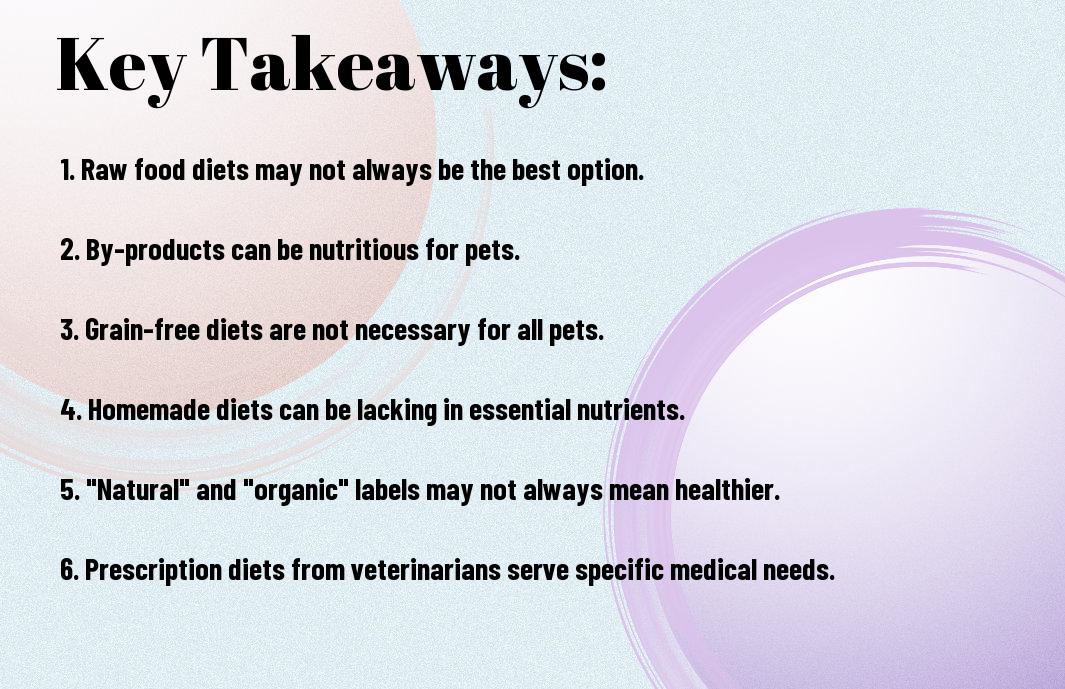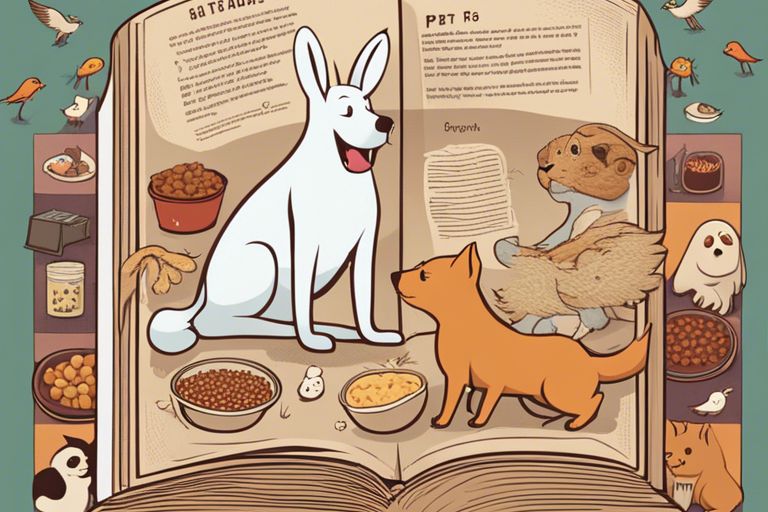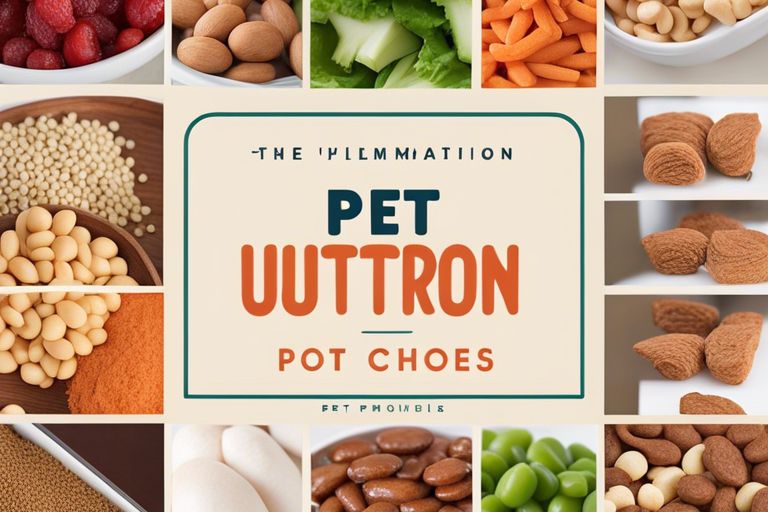Pet nutrition is a topic that often stirs up controversy and confusion among pet owners. With so much conflicting information available, it can be difficult to separate fact from fiction when it comes to feeding our furry companions. In this blog post, we will delve into some of the most common myths surrounding pet food and reveal the truth behind them, backed by scientific evidence and expert opinions.
The world of pet food is rife with myths and misconceptions that can lead to unhealthy dietary choices for our beloved pets. As pet owners, it is crucial to have accurate information about what constitutes a balanced and nutritious diet for our pets. Through this post, we aim to debunk prevalent pet food myths and provide you with the knowledge needed to make informed decisions about your pet’s diet.
Key Takeaways:
- High protein diets are not harmful for pets: Contrary to popular belief, high protein diets are not harmful for pets and can actually be beneficial for their overall health.
- Grain-free diets are not always the best option: While grain-free diets have gained popularity, they are not always the best option for pets and may not provide the necessary nutrients for their well-being.
- Homemade diets can be unbalanced: It’s important to be cautious with homemade diets as they can often be unbalanced and may not meet all of your pet’s nutritional needs.
- Raw diets come with potential risks: Raw diets for pets can come with potential risks such as bacterial contamination and nutrient deficiencies.
- Preservatives are essential for pet food safety: While the idea of preservatives may seem off-putting, they are essential for ensuring the safety and shelf-life of pet food.
- Consulting a veterinarian is crucial for choosing the right diet: It’s important to consult a veterinarian to determine the best diet for your pet based on their individual needs and health conditions.
- Quality ingredients matter: Pay attention to the quality of ingredients in your pet’s food and choose options that are nutritionally balanced and free from unnecessary fillers.


Understanding Pet Nutrition
Any responsible pet owner knows that proper nutrition is crucial for the health and well-being of their furry companions. Understanding the basics of pet nutrition is essential for providing the best care for your pets.
Basic Nutritional Needs of Pets
Basic understanding of the nutritional needs of pets is the foundation for choosing the right food for your furry friend. Just like humans, pets require a balance of protein, carbohydrates, fats, vitamins, and minerals to thrive. Proteins are essential for muscle development and repair, while carbohydrates provide energy. Fats are necessary for healthy skin and coat, and vitamins and minerals play a crucial role in various bodily functions.
Deciphering Pet Food Labels and Ingredients
Needs Deciphering the labels and ingredients of pet food can be a daunting task, but it is important for making informed decisions about what you are feeding your pet. Pay attention to the first few ingredients, as they make up the majority of the food. Look for high-quality protein sources and healthy fats. Avoid artificial preservatives, colors, and fillers, and opt for natural and nutritious ingredients. Additionally, understanding the guaranteed analysis and the AAFCO (Association of American Feed Control Officials) statement on the label can provide valuable information about the nutritional adequacy of the food.
To ensure that you are meeting your pet’s nutritional needs, it is crucial to decipher pet food labels and understand the ingredients. By paying attention to the quality of the ingredients and the nutritional information provided on the label, you can make informed choices and provide your pet with the best possible diet. Your pet’s health and well-being depend on it.
Myth 1: “Human Food Is Always Bad for Pets”
After reading various pet food myths, it’s important to address the misconception that all human food is harmful to pets. This myth has been circulating for years, contributing to the belief that only commercial pet food is suitable for our furry friends. However, the reality is quite different. In fact, there are certain human foods that can actually benefit your pet’s health. To debunk this myth and learn more about the truth behind common pet food misconceptions, you can visit Fact Vs Myth: Common Raw Pet Food Myths Debunked.
Unpacking the Myth
Always assuming that human food is harmful for pets overlooks the fact that many natural, unprocessed foods can provide essential nutrients and health benefits. While it’s true that some human foods can be toxic to pets, it’s important to consider individual ingredients and their potential impact on your pet’s health. By understanding the nutritional value of specific foods, you can make informed decisions about incorporating them into your pet’s diet.
Always consulting with a veterinarian before introducing new foods is essential, as they can provide expert guidance on which human foods are safe for your pet and in what quantities.
When Human Foods Are Safe for Pets
Pets can safely consume many human foods, such as lean meats, fruits, and vegetables, in moderation. Understanding which foods are safe can help diversify your pet’s diet and provide a range of nutrients. Safe human foods for pets include cooked chicken, carrots, and blueberries, which can offer valuable nutrition and contribute to a well-rounded diet.
Always introducing new foods gradually and monitoring your pet for any adverse reactions is crucial in determining their tolerance and suitability for specific human foods. By doing so, you can ensure that your pet’s diet remains balanced and nutritious.
Myth 2: “Grain-Free Diets Are Healthier for All Pets”
For many pet owners, the idea of feeding their furry companions a grain-free diet seems like the best way to ensure their health and well-being. However, the belief that all pets will thrive on a grain-free diet is not entirely accurate. In fact, there are important considerations to take into account before deciding whether a grain-free diet is the right choice for your pet.
Examining the Grain-Free Trend
With the rise in popularity of grain-free diets for pets, it’s important to examine the trend from a critical standpoint. While some pets may benefit from a grain-free diet, it’s not a one-size-fits-all solution. Pet owners should be wary of marketing tactics that promote grain-free diets as the ultimate answer to their pet’s health needs. It’s essential to consider each pet’s unique dietary requirements and consult with a veterinarian to determine the best nutritional plan for their individual needs.
The Role of Grains in Pet Health
On the other hand, grains can provide essential nutrients and fiber that contribute to a balanced diet for some pets. Contrary to popular belief, grains may not be inherently harmful to all pets and can be part of a healthy diet when chosen thoughtfully. It’s important to recognize that not all grains are created equal, and some pets may tolerate certain grains better than others. Myth 2: “Grain-Free Diets Are Healthier for All Pets”.

Myth 3: “Meat By-Products Are Just Filler”
To debunk this common myth, it is important to understand the true value of meat by-products in pet food. By clarifying misconceptions, we can provide pet owners with accurate information to make informed decisions about their pet’s nutrition.
Defining Meat By-Products
Meat by-products are parts of an animal that are not typically consumed by humans, such as organs, blood, and bones. Contrary to popular belief, these by-products are not just filler ingredients, but rather an excellent source of essential nutrients for pets. When used in pet food, meat by-products can provide a concentrated source of protein, vitamins, and minerals that are crucial for a balanced diet.
The Nutritional Value of By-Products in Pet Food
With the misconception that meat by-products are low in nutritional value, it is important to clarify that these ingredients can offer a range of nutrients that benefit pets. By-products contain valuable proteins, fats, and other essential nutrients that contribute to a pet’s overall health and well-being. While they may not be the same as the muscle meats commonly found in human food, by-products play an important role in providing a complete and balanced diet for pets.
Any pet owner concerned about the nutritional value of meat by-products should understand that when used in pet food, these ingredients undergo rigorous processing and quality control measures to ensure their safety and nutritional contribution to the overall diet.

Myth 4: “All Preservatives Are Harmful to Pets”
Unlike popular belief, not all preservatives are harmful to pets. In fact, proper food preservation is essential to ensure the safety and quality of pet food. To learn more about debunking pet food myths, check out Debunking Pet Food Myths: What You Really Need to Know.
Understanding Food Preservation
With the rise of pet food recalls, the importance of proper food preservation cannot be overstated. Preservatives are additives used to prevent spoilage and extend the shelf life of pet food. They help maintain the nutritional value of the food and protect it from harmful bacteria and mold.
Preservatives can be natural or synthetic, and they play a crucial role in ensuring that pets receive safe and nutritious food.
Differentiating Between Preservative Types
Any discussion about preservatives in pet food must differentiate between the types of preservatives used. It is essential to understand the differences between natural preservatives, such as vitamin E and vitamin C, and synthetic preservatives, such as BHA and BHT. Perceiving the distinction between these types of preservatives is crucial in determining their potential impact on pets.
- Vitamin E and vitamin C
- BHA and BHT
Importantly, the information should be broken down into a
with 2 columns and 5 rows to clearly illustrate the differences between natural and synthetic preservatives in pet food. It is important to note that some preservatives have been linked to health concerns in pets, leading to a greater focus on using natural preservatives in pet food formulations.Myth 5: “Raw Diets Are the Most Natural and Nutritious”Despite the common belief that raw diets are the most natural and nutritious option for pets, the truth is far more complex. While raw feeding has gained popularity in recent years, it’s important to separate fact from fiction when it comes to the health and well-being of our furry companions.Exploring the Raw Diet PhilosophyTo understand the appeal of raw diets, it’s essential to delve into the philosophy behind this feeding approach. Proponents argue that raw diets mimic what animals would eat in the wild, promoting the idea that raw meat, bones, and organs are the most natural and biologically appropriate food for pets.Risks and Benefits of Raw FeedingPhilosophy aside, it’s crucial to examine the risks and benefits associated with raw feeding. Proponents highlight the potential benefits such as improved coat health, dental hygiene, and overall vitality. However, it’s equally essential to acknowledge the potential risks, including bacterial contamination, nutritional imbalances, and potential harm from consuming bones.For instance, raw diets can pose a risk of bacterial contamination for both pets and their owners, given the handling and storage of raw meat. Furthermore, nutritional imbalances can arise if the diet is not carefully formulated, potentially leading to deficiencies or excesses of essential nutrients.Decision Making in Pet NutritionNot all pet foods are created equal, and as pet owners, it’s our responsibility to make informed decisions about what we feed our furry friends. With the abundance of options available on the market, choosing the right pet food can be overwhelming. However, with the right knowledge and guidance, you can navigate through the myths and misconceptions surrounding pet nutrition.How to Choose the Right Food for Your PetMaking the right choice when it comes to your pet’s nutrition involves considering their specific dietary needs, age, breed, and any existing health conditions. It’s important to look for pet food that is formulated to meet the nutritional requirements of your pet. This means taking into account the right balance of protein, fats, carbohydrates, vitamins, and minerals.Embracing a Balanced Perspective on Pet Diet ChoicesWith the plethora of opinions and information available on pet diets, it’s crucial to approach the topic with a balanced perspective. Your pet’s nutrition should be based on scientific evidence and the expertise of veterinarians and animal nutritionists. It’s essential to understand that there is no one-size-fits-all approach to pet nutrition, and what works for one pet may not necessarily work for another.Your pet’s diet plays a critical role in their overall health and wellbeing. Therefore, it’s important to make informed decisions based on their individual needs, rather than falling prey to common myths and misconceptions surrounding pet food. By embracing a balanced perspective, you can ensure that your pet receives the nutrition they need to thrive.Uncovering The Truth – Debunking Common Pet Food MythsUltimately, it is important for pet owners to be well-informed about the reality of common pet food myths in order to make the best decisions for their furry friends. By understanding the truth behind these misconceptions, pet owners can provide their pets with the appropriate nutrition and care that they deserve. It is essential to rely on credible sources of information, such as veterinary professionals and reliable research, when seeking out knowledge on pet nutrition to ensure the health and well-being of our beloved animals.Through thorough research and debunking these common pet food myths, we can better understand the needs of our pets and make informed decisions about their nutrition. By dispelling these myths, we can ensure that our pets are receiving the proper nourishment and care they require for a long and healthy life. It is vital for pet owners to continue educating themselves on pet nutrition to provide their pets with the best diet and overall quality of life.FAQQ: What are some common pet food myths?A: Some common pet food myths include the belief that raw food diets are always healthier, or that grain-free diets are necessary for all pets. These myths can mislead pet owners about their pet’s nutritional needs.Q: Are raw food diets always healthier for pets?A: While some advocates claim raw food diets are superior, there is no conclusive scientific evidence to support this. Raw diets also pose potential health risks from foodborne pathogens and nutritional imbalances.Q: Do pets need grain-free diets?A: Most pets do not require a grain-free diet. Grains can be a valuable source of nutrients for dogs and cats, and eliminating them without proper substitution can lead to nutritional deficiencies.Q: Is it true that by-products are harmful in pet food?A: By-products are often misunderstood and can actually provide essential nutrients for pets. They are not inherently harmful and can be a valuable, sustainable source of nutrition.Q: Should pet food always be labeled ‘natural’ or ‘organic’?A: ‘Natural’ and ‘organic’ labels are not necessarily indicative of better quality. These terms can be misleading and do not guarantee nutritional superiority. It’s important to look at the full ingredient list and nutritional content instead.Q: Can homemade pet diets be better than commercial pet foods?A: Homemade diets can be challenging to balance properly and can lead to nutrient deficiencies or excesses. Commercial pet foods are formulated to meet pets’ nutritional needs and are often a more reliable option.Q: Are all commercial pet foods formulated equally?A: Not all commercial pet foods are created equal. It’s important to choose reputable brands that conduct feeding trials, adhere to AAFCO (Association of American Feed Control Officials) guidelines, and have a solid track record of quality and safety.











